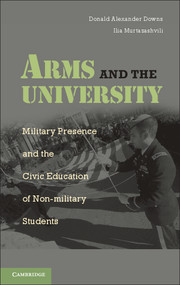Book contents
- Frontmatter
- Contents
- Tables
- Acknowledgments
- Part I A Normative and Pedagogical Framework
- Part II ROTC and the University
- Part III Military History Examined
- 10 Military History
- 11 Half Empty or Half Full?
- 12 Military Presence in Security Studies
- 13 Security Studies in the Wake of the Cold War University
- Part IV Concluding Thoughts
- Index
- References
13 - Security Studies in the Wake of the Cold War University
Paragons of Productive Friction, or Throwing the Baby out with the Bathwater?
Published online by Cambridge University Press: 05 June 2012
- Frontmatter
- Contents
- Tables
- Acknowledgments
- Part I A Normative and Pedagogical Framework
- Part II ROTC and the University
- Part III Military History Examined
- 10 Military History
- 11 Half Empty or Half Full?
- 12 Military Presence in Security Studies
- 13 Security Studies in the Wake of the Cold War University
- Part IV Concluding Thoughts
- Index
- References
Summary
While military strength and political power are the preconditions for lasting national greatness, the substance of that greatness springs from the hidden sources of intellect and morale, from ideas and values.
– Hans MorgenthauThe theoretical discussion of the preceding chapter sets the stage for a consideration of military presence in security studies programs. In particular, we are interested in the degree to which security studies programs emphasize academic perspectives provided by military history and political realism, as well as the extent to which they integrate the military into their curriculum. To be clear, military history and realism are different academic approaches, yet they are intellectual cousins in their emphasis on the study of war and force in historical perspective, and for this reason, we underscore political realism as one of the critical components of military presence in the university.
Empirically, we present surveys of leading programs as well as several short case studies. We believe there are at least three reasons that our empirical focus is important. First, unlike existing surveys of international relations as a field, our emphasis is on security studies programs. The discipline of security studies requires special attention because it is the branch of international relations that is most likely to train individuals who participate in national security policy. Second, in contrast with existing studies of the discipline of security studies, which focus on the relatively narrow issue of funding and participation in some of the high-profile programs such as Human Terrain and the Minerva Initiative, we consider military presence within these programs – not simply physical presence, but the intellectual presence of military-related courses and content. Third, because our emphasis is on the philosophical and normative significance of political realism in security studies, our empirical component continues the discussion that we initiated in Chapters 1, 2, and 12 regarding the importance of political realism in the discipline of security studies.
- Type
- Chapter
- Information
- Arms and the UniversityMilitary Presence and the Civic Education of Non-Military Students, pp. 381 - 408Publisher: Cambridge University PressPrint publication year: 2012



